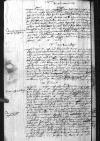Unserr negst ⌊⌋, den XXIIII dis negst vorschine[n] Februarii / an Ewer Erbarkeit ausgangen nebenn unsers ⌊ohmenn⌋ vo[n] ⌊Rom⌋ briff, / wirt Ewer Erbarkeit etwann, wie nicht unbillich, betrubt habnn. / Wir sein ab[er] der zuvorsicht, / das sich die gotlichen willenn mit gedult undergebnn, / u[nd] habnn bisher gewartet, / ob Ewer Erbarkeit unsernn ohmenn widerummb g[en] Rom heth wollenn schreibenn etc. Ummb die dreissig hungeris[che] gulden, die ir uns zugeschickt / und die wir an die ⌊Fug...schen⌋ vorschribenn, / hab wir noch kein kuntschafft. W[as] uns derhalben wirt zukomenn, wolle wir Ewer Erbarkeit mit den er[sten] nicht vorhalten etc. Uns sein gestrigs tags von koniglichen hove diss[e] beigelete brive in Ewer Erbarkeit ⌊bruders⌋ sachen, die wir gefurdert, / zukomenn, / woll[en] die selbten mit unsermm schreibenn an in bestellenn. Ouch hab wir negst durch dennn edlen, wolgebornen hern ⌊elbings[chen] castellann⌋ etc. Ewer Erbarkeit beger des dorffs halben etc. mit sondrenn fleissigen bittenn ⌊konigliche majestet⌋, unsern allergnedigsten hern, lossen anbringenn solchs h... euc[h] gemelter her ⌊castellann⌋ / vortzustellenn zugesagt, / derwe... wir in gutter hoffnung sein. / Was erlangt wirt, / s... Ewer Erbarkeit nicht unangeczeigt bleibnn. / Der wir vil ehre un[d] nucz zuschaffen / geneigth uns erbitten und willig. / Gotlichnn gn[aden] befolenn. /
